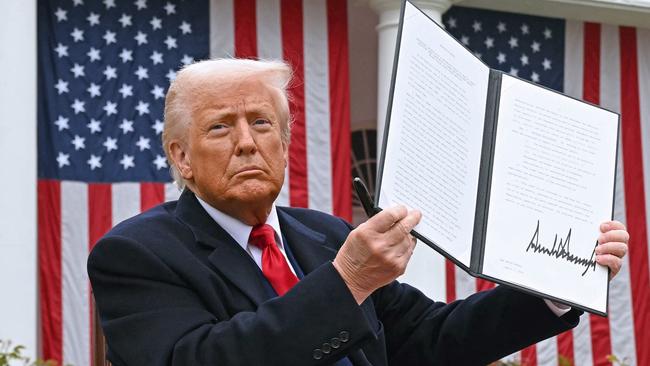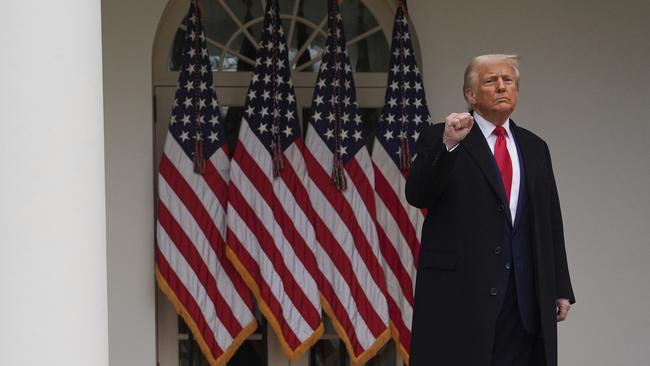ASX Trader: Rate hikes, job cuts, sticky inflation: What Trump’s tariffs could mean for you
The domino effect from Donald Trump’s tariffs is likely to be felt far and wide and we may look back on this week not as the start of a trade war but a market reset, writes ASX Trader.
QLD Business
Don't miss out on the headlines from QLD Business. Followed categories will be added to My News.
Donald Trump dropped a global bombshell and Australia was caught in the blast.
The US President declared April 2nd “Liberation Day,” saying it’s time for America to stop being taken advantage of in global trade - and to do that, he’s introduced new taxes called tariffs on goods coming into the US from almost every country in the world.
And yes, Australia is on that list.
But what does it mean to our daily lives?
Well, it could mean interest rate hikes, lost profits, job cuts, stalled growth and sticky inflation, writes ASX Trader.
So, what are tariffs?
A tariff is just a tax added to imported goods.
It makes things from overseas more expensive.
For example, if an Australian wine costs $20 in the U.S., and a 10 per cent tariff is added, the price jumps to $22.
That extra cost often gets passed to shoppers, meaning fewer people might buy the product.
Tariffs are meant to encourage Americans to buy more local products, but they also make things more expensive and that can hurt trade partners like Australia.

Who’s affected?
Trump has added:
• 10 per cent tax on almost everything entering the U.S.
• Higher taxes on certain countries:
o Vietnam – 46 per cent
o China – 34 per cent
o Taiwan – 32 per cent
o Japan – 24 per cent
o EU – 20 per cent
o India – 26 per cent
o All foreign cars – 25 per cent
Only Canada and Mexico are excluded. Australia is not.
Why it’s a big deal for us
Australia sells a lot of products to the US including:
• Wine
• Beef and lamb
• Minerals like lithium and iron ore
• Solar panels and clean energy tech
Now that our goods will cost more in the US demand might drop, hurting Aussie businesses. That could mean lost profits, job cuts, and lower earnings for exporters.
Markets running hot, could this be a healthy reset?
As I’ve highlighted in recent articles, American equity markets are already trading at historic highs, buoyed by optimism that inflation is cooling, interest rates will be cut soon, and earnings growth will stay strong.
It’s been a near-perfect backdrop for investors.
But Trump’s tariff announcement adds a new layer of complexity, one that may test just how much good news is already priced in.
Two widely followed indicators show just how optimistic markets have become:
• The Buffett Indicator (which compares the total value of the stock market to GDP) is currently at its highest level ever, suggesting shares may be priced richly compared to the size of the economy.
• The Shiller PE Ratio, which smooths earnings over 10 years, is also elevated - at levels last seen during the early 2000s tech boom.
This doesn’t mean a major correction is coming but it does suggest markets may need to adjust if new risks emerge

Could this spark a repricing on equities?
Possibly and here’s why.
Tariffs drive up the cost of goods.
That puts pressure on company profit margins, especially for manufacturers and import-heavy businesses.
At the same time, inflation could creep back up forcing central banks like the US Federal Reserve and RBA to hold off on rate cuts or even hike again.
If the economic outlook shifts from “soft landing” to “stalling growth and sticky inflation,” equity valuations will likely come down fast.
That’s not panic, it’s repricing.
When earnings look less certain and rates stay higher for longer, investors start paying less for future profits.
A shift in global trade?
Looking beyond short-term market moves, Trump’s tariffs may be part of a broader shift in how countries trade.
• Nations could respond with their own tariffs, prompting changes in supply chains.
• We might see the rise of regional trade blocs, where countries focus on local partnerships over global ones.
• Countries like Australia, with large export sectors, may look to diversify further into Asia and reduce reliance on US demand.
This could mark a move toward economic self-sufficiency, something we saw glimpses of during the Covid era.
While it may increase costs in the short term, it could also open new opportunities for nations that adapt quickly.
What should investors watch next?
Rather than reacting emotionally, investors can keep an eye on a few key signals:
• Company earnings: Are businesses mentioning rising costs or slowing sales in the US?
• Bond markets: If long-term yields creep higher, growth stocks may come under pressure.
• Central bank policy: Any shift in tone from the RBA or Fed could influence sentiment.
• Sector rotation: Defensive and value-oriented stocks might quietly start leading.
Final thought: A moment to reassess
The market has been priced for smooth sailing.
Trump’s tariffs may simply be a reminder that the outlook can change quickly, and it’s smart to stress-test assumptions.
This doesn’t have to be the start of a downturn it could be a healthy moment of reflection, where investors, policymakers, and businesses adjust to a world that’s always in motion.
If anything, it’s a chance to stay informed, stay agile, and avoid complacency as we move into the next phase of the global cycle.
We may look back on this week not as the start of a trade dispute - but as the start of a market reset.
More Coverage
Read related topics:ASX Trader





